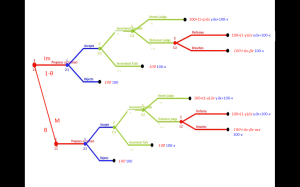This project consists of an experimental part and a theoretical part and it aims to examine the relationship between institutional trust, people’s trust for the society (the legal system in this case), and the contract designing process. For instance, this is intuitive to think that the more people trust the court, the more willing they are to make contracts, because they believe that contracts will be enforced and their interests respected. We want to test this idea and we do so by creating an experiment that mimics the contract making process.
The experiment involves an investor and an entrepreneur. The entrepreneur is tasked to offer a contract to attract investment. The investor would then choose whether and how much to invest based on her knowledge of the trustworthiness of the court and the entrepreneur. The game gets repeated in different combinations of the trustworthiness. By examining the contracts that the parties come to, we hope to find some patterns of behavior.
The game tree
In the theoretical part of the project, we calculated the theory-predicted equilibrium contracts, and we found that in general, the entrepreneur would be better off offering a lower return and committing to following the contract than if she offers a high return and later on decides to break the contract.
The next step for the project is to add another treatment. If the entrepreneur paid something back to the investor in the last round, she would get a start in front of her name. We expect this reputation signal to affect the entrepreneur’s behavior, and in particular to make them more trustworthy.

